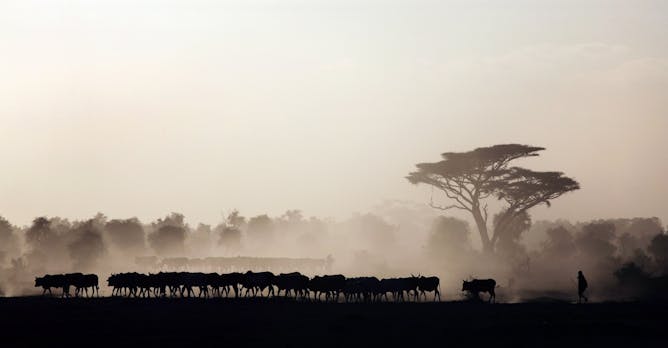|
What is the image we Canadians have about our own country? That we treat our citizens better than other countries treat theirs? Today in The Conversation Canada, four academic authors use research and data to paint a much starker – but realistic – image of Canada. Dennis Raphael, Morris Komakech and Ryan Torrence of York University and Toba Bryant of the University of Ontario Institute of Technology look at the level of poverty in the country and how the electoral system does little for those who need the most help.
Jose Perez-Casal of the University of Saskatchewan tells us about a new vaccine that could prevent a serious lung plague that causes disease and death in cattle in Africa – which leads to more than US$60 million in losses annually.
And finally…in another story about the developing world, Maisam Najafizada and Jill Allison of Memorial University look at the important role that women health-care volunteers play in countries like Afghanistan, Nepal and Ethiopia. Despite these vital roles, the patriarchal communities they serve means the women are undertrained and undervalued.
Regards,
|

A resident of Shoal Lake 40 First Nation is photographed while speaking about water and access issues in her community in February 2015. The Shoal Lake community, despite supplying water to the city of Winnipeg, has long been under a boil-water advisory and is only just getting year-round road access.
THE CANADIAN PRESS/John Woods
Dennis Raphael, York University, Canada; Morris Komakech, York University, Canada; Ryan Torrence, York University, Canada; Toba Bryant, University of Ontario Institute of Technology
Governments in Canada are routinely enacting public policies that primarily benefit economic elites, raising questions about government legitimacy and competency. Who's looking out for us?
|

A Masai herdsman walks with his cattle in Amboseli National Park in Kenya.
(Shutterstock)
Jose Perez-Casal, University of Saskatchewan
Lung plague attacks cattle causing disease and death, and more than US$60 million in losses annually in Africa. A new vaccine could prevent the disease.
|

Women in Nepal are tapped for volunteer health work. Many take on the work out of a sense of duty, but also gain access to otherwise inaccessible opportunities. Here women are seen on a bus in Pokhara, Nepal.
Terry Boynton/Unsplash
Maisam Najafizada, Memorial University of Newfoundland; Jill Allison, Memorial University of Newfoundland
Women health-care volunteers in places like Nepal, Afghanistan and Ethiopia play a vital role in the health system, yet they are undervalued and undertrained.
|
Culture + Society
|
-
Kate Burridge, Monash University; Howard Manns, Monash University
Ever wonder where the words 'sport', 'umpire' and 'drubbing' come from? Here's a short primer of sporting lingo ahead of the AFL and NRL Grand Finals.
|
|
Politics
|
-
Meg Bond, University of Massachusetts Lowell
Anita Hill charged in 1991 that Supreme Court nominee Clarence Thomas sexually harassed her. He was still confirmed. Now, another nominee faces sexual assault allegations. Have times changed?
-
Ashwini Tambe, University of Maryland
What exactly do we mean by teenage behavior? And who gets to be this kind of teenager?
|
|